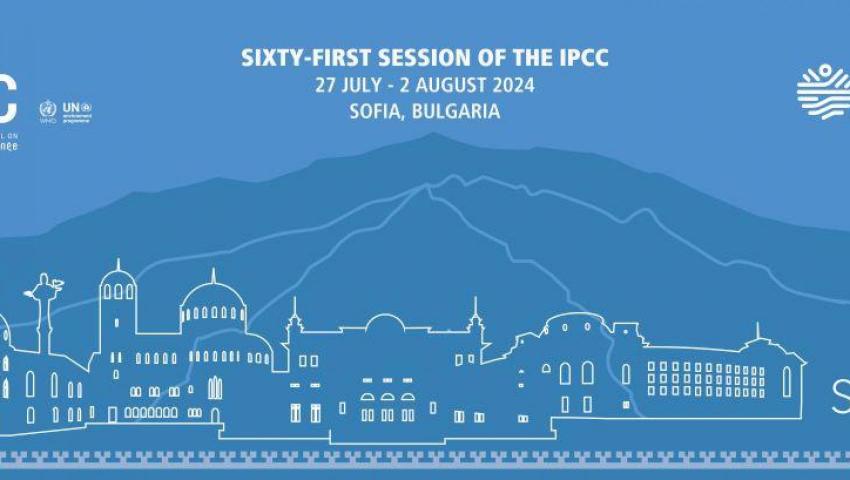Over 30 Bulgarian and international scientists learned about the rules for participation in IPCC climate reports

The Vice-President of the Intergovernmental Panel on Climate Change (IPCC), Diana Urge-Forzac, explained today to Bulgarian and international scientists and researchers how they can contribute to the work of the most influential international scientific organization in the field of climate change.
The organizer and host of the webinar "How to become an IPCC author" is the Ministry of Environment and Water (MoEW). More than 30 representatives of scientific circles in Europe and the world participated in it. The event is part of the accompanying program to Bulgaria's hosting of the 61st session of the IPCC, which took place in Sofia between July 27 and August 2.
"Our reports have a significant impact on climate policies," said Urge-Forzac. While the reports do not recommend specific policies, but merely summarize the available scientific knowledge about the climate system and our options for adaptation and mitigation, they lead to significant progress in international climate negotiations. For example, after the publication of the IPCC's Second Assessment Report in 1995, the Kyoto Protocol was signed (in 1997), and the Fifth Assessment Report (2013-4) led to the signing of the Paris Agreement (2015). After the Fourth Assessment Report, the IPCC received the Nobel Peace Prize.
In the period 2011-2017, however, only a few Bulgarian scientists participated in thematic meetings within IPCC working groups, and currently there are no official authors from Bulgaria and some other Eastern European countries in the IPCC. Europe is mainly represented by authors from Northern and Western Europe. However, the interest is already high, said Ivona Grozeva, head of the "Adaptation to Climate Change" department at the main directorate "Climate Change Policy" in the MoEW. Grozeva is the national coordinator for Bulgaria and is responsible for the relationship between the IPCC and the Bulgarian scientific community.
The participation of more Bulgarian scientists in the IPCC would significantly help the study of the specific climate risks for our region and the appropriate solutions for mitigation and adaptation. In addition, it is IPCC policy to include authors from many geographic regions to ensure a balance of diverse perspectives and knowledge.
Urge-Forzac explained the process of preparing the reports and the many opportunities for participation and input from scientists and researchers. Within the framework of the IPCC, approximately every 7 years, hundreds of scientists and experts from around the world review all available current information on the climate, its impacts and future risks, as well as the options for reducing the rate of climate change and for adaptation, systematizing thousands scientific articles in reports. Three main reports are prepared, as well as special reports on various topics. Each paper has several hundred authors, as well as thousands of expert reviewers who comment on the papers to ensure they include a variety of disciplines and perspectives.
Participants work voluntarily, often contributing many hours of work as part of their regular duties at research institutions or universities in their own countries, Urge-Forzac explained. For example, sometimes a chapter receives thousands of comments, and each comment must be reviewed by the editors, addressed and possibly integrated, and the process documented in a transparent manner.
Voluntary commitment is key to ensuring scientists' impartiality and objectivity, as well as their independence from corporate interests, Urge-Forzac said. Another guarantor of the Panel's independence is that it only accepts funding from governments. Procedures are also in place to identify conflicts of interest.
"We all work driven by passion and our own commitment to both science and solving the problem of climate change," Urge-Forsatz emphasized. Interest in participating is always overwhelming, even though there is no fee to participate, she said. Within the sixth evaluation cycle, for example, the Panel receives 1,300 nominations, of which only a small number are selected for participation.
An invitation to nominate authors for the Seventh Assessment Cycle will be published very soon, and representatives of Bulgarian universities and research institutions will be able to submit applications. Approval of authors is done by the IPCC Bureau, which takes into account not only the qualifications of the authors, but also their expertise and nationality. “Most applicants are equally qualified, but the IPCC strives to select participants who represent a variety of disciplines and geographic regions. We strive for gender balance as well. If you are not selected, never interpret it as a failure," Urge-Forzac summed up.
The preparation of the IPCC reports will go through several stages of editing and approval by both expert and by governments. But governments do not edit the scientific part of the reports. "At the end of the day, scientists hold the pen," Urge-Forsatz said. The seventh evaluation cycle is expected to end at the end of 2029.
